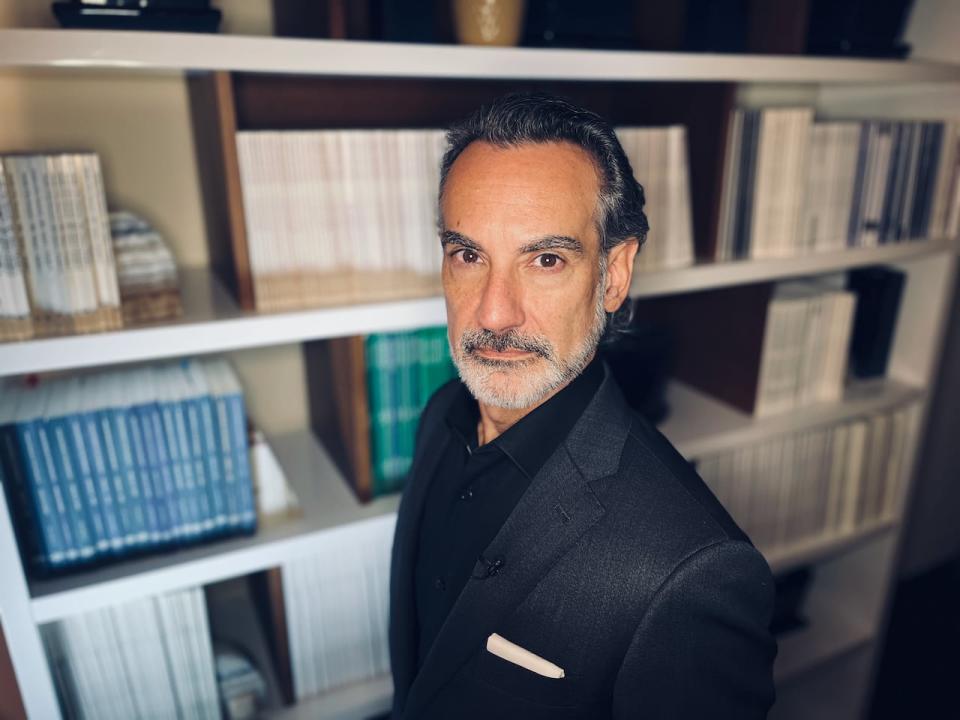Nurse tells B.C. hearing she's not transphobic, but calls gender identity 'metaphysical nonsense'

A B.C. nurse accused of making numerous "derogatory and discriminatory" public statements about transgender people took the stand in her discipline hearing on Friday, telling the panel considering her case that she is not transphobic.
During a hearing at the B.C. College of Nurses and Midwives, Amy Hamm of New Westminster testified that her advocacy on social and other platforms is meant to protect women and children from what she described as dangerous infringements into sex-segregated spaces.
"I'm not transphobic. I don't have any issue with trans people — it's the infringement on women and children's rights," Hamm told the college disciplinary panel.
She said she is fighting against what she described as a "fringe" movement of activists influencing official positions on transgender rights and access to gender-affirming care.
"It's a movement that is infringing on the rights of women and pushing institutions to adopt what are false and delusional beliefs," she said.
Hamm faces allegations of unprofessional conduct for making "discriminatory and derogatory statements regarding transgender people" while identifying herself as a nurse, according to a citation from the college.
Hamm frequently refers to transgender women as "men" in social media posts, videos and podcasts, implying they pose a danger to cisgender women and children. She has referred to the disciplinary proceedings as a "witch trial" and suggested the college "would love for me to suicide myself."
She has also said she rejected a proposed settlement from the college that would have seen her agree to a two-week licence suspension and social media training.
Hamm testified Friday that she became aware of the college's investigation in 2021 after she co-sponsored the erection of a billboard on Hastings Street in Vancouver reading "I [heart] J.K. Rowling" in support of the author, who has made public comments that have been criticized as anti-trans by LGBTQ groups and other advocates.
'It feels as though people don't seem to care'
She told the panel she is particularly concerned about transgender women having access to women-only spaces including prisons and change rooms. She pointed to examples like Madilyn Harks, a transgender woman with a history of sexually assaulting young girls who has been housed in women's correctional facilities.
"It makes me extremely, extremely angry, and it feels as though people don't seem to care what happens to these women," she said of female inmates.
She said she completely rejects the concept of gender identity, calling it "anti-scientific, metaphysical nonsense."

A person holds up a transgender flag at a rally in the U.S. in 2018. Nurse Amy Hamm says a fringe group of activists are pushing Canadian institutions to accept 'false and delusional beliefs.' (Brendan McDermid/Reuters)
Nonetheless, Hamm told the panel that she always uses people's preferred pronouns at work, because that is her employer's policy.
"Whether or not I agree with certain policies, I limit my advocacy for changing policies to outside of work," she said.
On social media, Hamm has tweeted sentiments such as "we have eyeballs and we will continue to use them to misgender you." She has suggested adults who identify as non-binary are making "an extremely embarrassing display of narcissism and low intelligence."
Hamm acknowledged to the panel that some of her social media posts might come across as offensive or shocking, but her objective is to engage people in conversation.
She also testified that she has faced numerous death and rape threats in response to her activism and is currently on stress leave from her job at a Metro Vancouver hospital as a result.
Expert questioned about research supporting claims
Earlier in the week, Toronto psychologist James Cantor, who is testifying as an expert witness for Hamm's defence, addressed what he saw as the potential social value in Hamm's statements.
He said her comments might actually help transgender people by exposing them to diverse opinions, saying they reflect "a large chunk" of public thought on the issue.
"When a person is able to escape and simply not deal with uncomfortable ideas … one fails to develop the skills anyone needs to live in a diverse society," Cantor said.

Since 2021, Toronto psychologist James Cantor has testified in more than 20 cases in the U.S. involving transgender issues. (Craig Chivers/CBC)
Cantor, a popular expert witness for American states defending anti-trans laws, faced cross-examination by college lawyers and the discipline panel on Thursday and Friday.
Panel members questioned Cantor on Friday about the research supporting some of the claims he's made during his testimony.
Cantor has repeatedly asserted that social media is responsible for an increase in the number of adolescents identifying as transgender since 2012. Panel member Sheila Cessford asked whether he could point to any peer-reviewed research confirming that theory, and Cantor suggested it would be impossible to conduct a proper randomized trial on the question.
When asked if there was any other published, non-randomized research on the subject, Cantor pointed to a single 2018 study based on a survey of parents who reported what they believed was "sudden or rapid onsets of gender dysphoria" in their teen or young adult children.
Panel member Jackie Murray then asked about the research supporting his claim that many people who claim to be transgender actually have borderline personality disorder. Cantor acknowledged that there is none, but said the symptoms are similar and the possibility should be investigated.
Cantor then claimed that scientists are "not being permitted" to do this type of research because of the "current culture."
Murray again asked for research supporting that claim, and Cantor said he was not aware of any.
The hearing is scheduled to resume on Monday with more testimony from Hamm.


